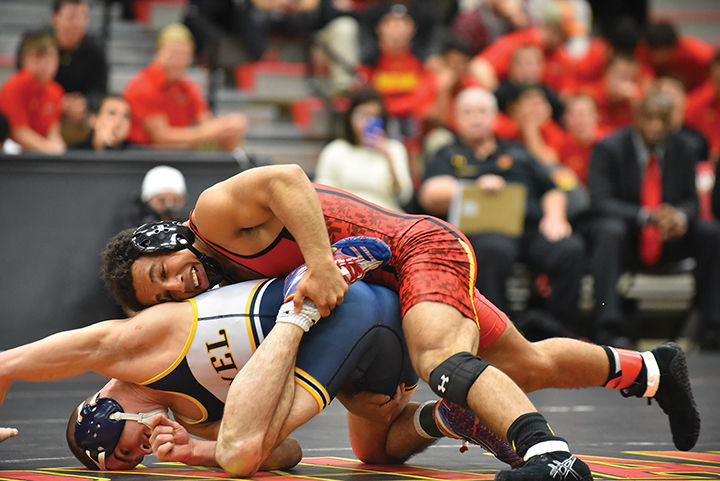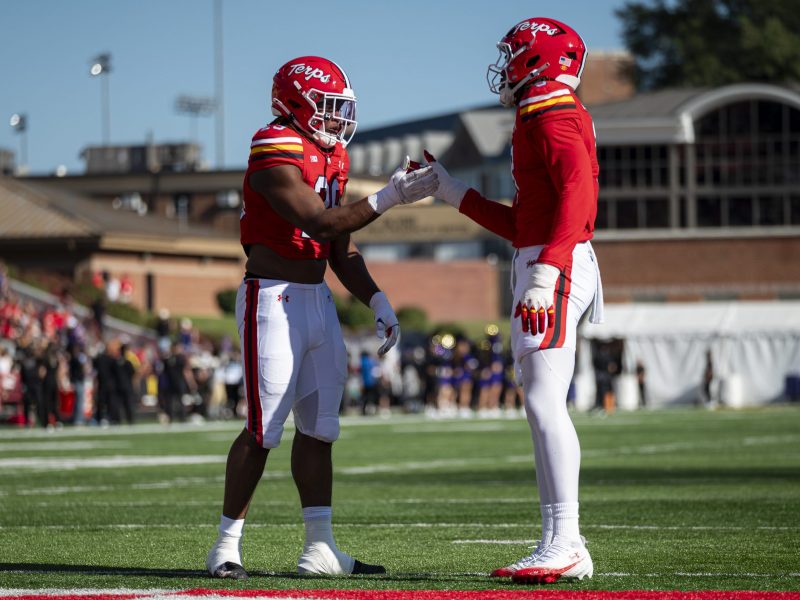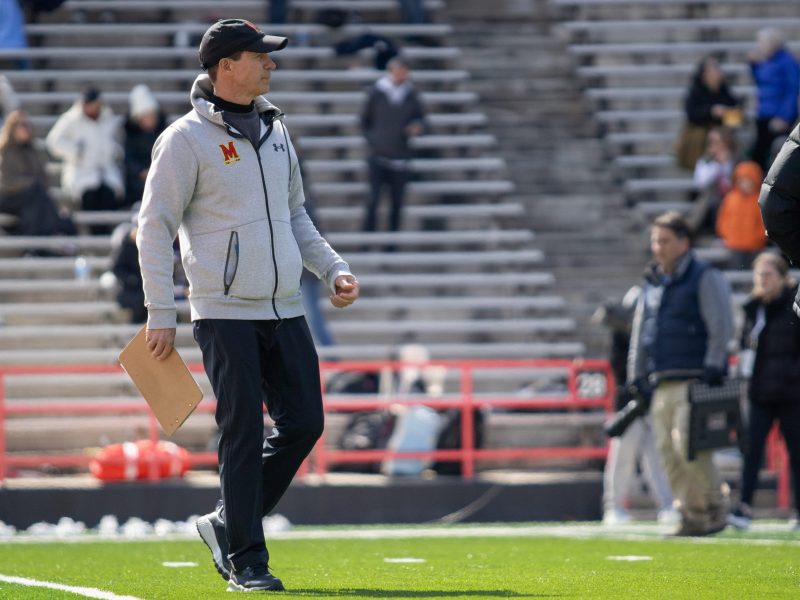On Jan. 10 at about 10:30 a.m., 125-pound Jhared Simmons arrived at Xfinity Center, prepared for the Terrapins wrestling team’s conference dual with Michigan State, which was set to begin at 1 p.m. After an hourlong workout with the rest of the Terps in the wrestling room on the bottom floor of the arena, Simmons arrived in front of a scale.
He stepped onto the scale. It blinked: 125.4.
At 0.4 pounds over weight, Simmons would be ineligible for competition. With 20 minutes to go until the official weigh-in, the sophomore tossed on his sweat suit and started to run.
“Wrestlers, they know their weight more than their schoolwork, probably,” Simmons said. “I know how much I’m weighing when I’m at home, when I’m here, when I’m on the road. It’s kind of funny — we’re all pretty OCD about it.”
Making weight is unique to wrestling, with no other sport putting the same regulations on weight control. If a wrestler weighs just one-tenth of a pound over the NCAA-regulated weight requirement, he is disqualified from competition. All his hard work is lost.
“There are very few sports where the measure is how much you weigh; it’s the only thing that matters,” coach Kerry McCoy said. “You have to be committed to it. It’s just like going on a diet.”
For years, wrestlers forced to cut weight engaged in unhealthy habits. Before the turn of the millennium, things were much less regulated, according to McCoy. Since the institution of those rules, McCoy has seen a drastic shift in “weight management.”
“Years ago, wrestling was much more crazy, like during my career,” said McCoy, a former Penn State wrestler. “They put these different things in for the health and safety of the athletes. A lot of steps have been taken by the wrestling community to make things a lot better. Definitely a lot healthier than it was, say, 15 years ago.”
There are many ways the Terps cut weight. After going through a recent practice, 141-pound Alfred Bannister was already dripping in sweat. So when he threw on an extra jacket and hopped on a stationary bike, the sweat kept flowing and his weight kept falling.
While Simmons acknowledged some wrestlers still adhere to unhealthy and illegal habits, he and Bannister believe that persistence and dedication to wrestling supersedes the alternative.
“If it means coming in at 10 o’clock and running,” Simmons said, “you’ve got to do it.”
The Terps also follow strict diets, and Colleen Davis, the university’s sports nutrition director, meets with the team often. Davis gave the team diet plans at the start of the season, with differentiations made between different weight classes.
Davis pushes them to eat their healthiest, and she also sprinkles in some extra healthy options: sushi or sandwiches with one slice of bread, among others.
In high school, many of the wrestlers found success despite unprofessional habits and not eating healthy. After finishing his high school career as the winningest wrestler in this state’s history, Bannister had trouble shaking some of his bad routines.
“I’m just one of the more hardheaded guys who think they can still eat Sour Patch Kids and all that other junk,” Bannister said. “I’ve started to come around. I had no choice.”
While most of the team splurges during the offseason, they focus on what they’re putting into their bodies when the season rolls around. Both Simmons and Bannister have felt their metabolism slow down in recent years, so they’ve buckled down on maintaining their health.
“Coach always tells us it’s about discipline,” Simmons said. “You may not be able to eat the extra piece of chicken; you [may] not be able to eat that last piece of salad. No soda, less Gatorade, a ton of water.”
The discipline and constant worrying about weight can get tedious for the Terps over the course of a five-month season. Simmons says he often checks his weight between 10 to 15 times a day, with many of his teammates doing the same.
Still, Simmons acknowledges the importance of it all. With an opportunity to be part of the Terps, indulging in temptation isn’t worth it. Even if he has to struggle to make weight before every competition.
“It’s those times, like, ‘Damn, I just want another piece of food,'” Simmons said. “You have to think, ‘I’m here to help the team out.’ So it’s a sacrifice you make, but I love it. It’s all worth it in the end.”



